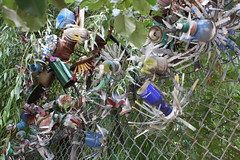East Ninth Street residents are used to seeing Rolando Politi’s trash art decorating La Plaza Cultural’s garden on the corner of Avenue C. Next year, the artist and “trash worship” advocate hopes that his flowers — made of bottle caps, plastic cups and aluminum cans — become as common in a part of Delhi, India.
Mr. Politi is raising funds to start a cooperative with 17 rag pickers in Delhi, who collect and sell trash by the pound for meager pay. His goal is to teach them how to transform the trash into one-of-a-kind flowers to sell to tourists. By spending less time collecting and more time creating, he said, workers could make 10 to 100 times their current wages at a lower risk to their health and safety.
“If it’s successful, the customers will be supporting ‘upcycled’ products directly from the rag pickers,” he said. “It would mean the rag pickers were getting respect and support.”
Mr. Politi’s jump from local artist (and veteran of the squatting movement) to budding social entrepreneur was sparked by the leader of Delhi’s trash-pickers union, Shashi Bhushan Pandit, who contacted the artist after seeing his work online.
When Mr. Politi traveled to Delhi last January to visit the rag pickers whom Mr. Pandit represents, he was warned that Indians wouldn’t buy trash, but he’s convinced tourists will. Now, Mr. Politi is looking for financial support so that the cooperative can launch next January or February when he returns to Delhi. He estimates that $15,000 would support the micro-enterprise for a year, and he’s working to raise $5,000 of that total himself. That will pay for indoor crafting space and some vending carts for the participants, 15 of which will be women.
Last week, Mr. Politi finished making instructional videos in the garden (with help from Cassia Reynolds, a contributor to The Local who profiled him in November). The video will be translated into Hindi to help the first group of workers assemble his “egg beauties” and “capolas,” as he calls them, out of the trash they collect every day.
“This is not an assembly line,” Mr. Politi said. “I prefer to call it reincarnation.”





